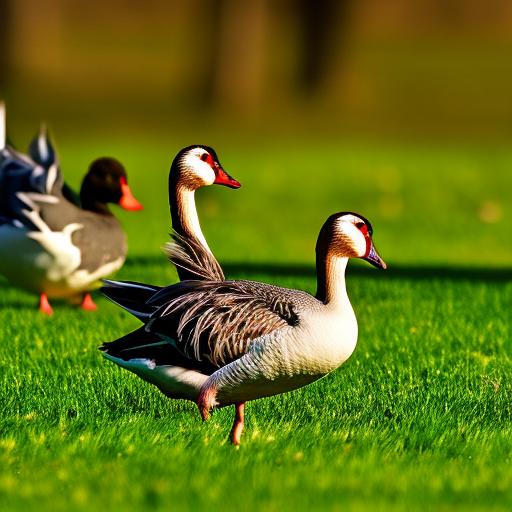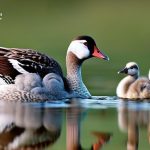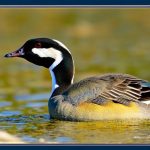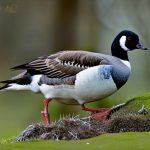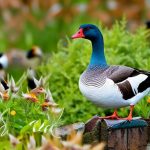Having geese on your lawn can be a nuisance and cause various problems. From damaging your grass and plants to creating noise and aggression, geese can disrupt the peace and beauty of your property. It is important to understand their behavior and the dangers associated with their presence. In this article, we will explore effective ways to keep geese away from your lawn and maintain a goose-free environment.
Key Takeaways
- Geese can cause damage to lawns and pose health risks due to their droppings.
- Understanding geese behavior can help in finding effective ways to keep them away.
- Geese droppings can contain harmful bacteria and parasites that can cause illness.
- Keeping geese away from your property is important to maintain a clean and safe environment.
- Effective ways to keep geese off your lawn include natural deterrents, fences, and audio/visual scare tactics.
The Problem with Geese on Your Lawn
Geese can cause several problems when they invade your lawn. One of the main issues is the damage they can do to your grass and plants. Geese are known for their grazing behavior, which involves pulling up grass and eating it. This can result in bare patches on your lawn and damage to flower beds and gardens. Additionally, their constant presence can lead to soil compaction, making it difficult for new grass to grow.
Another problem with geese on your lawn is the noise they create. Geese are not known for being quiet creatures, especially during mating season or when they feel threatened. Their honking can be loud and disruptive, causing annoyance to you and your neighbors.
Furthermore, geese can exhibit aggressive behavior, especially when they feel threatened or when they have young goslings. They may hiss, flap their wings, or even charge at people or pets that come too close. This aggression can pose a safety risk, particularly for children or individuals who are afraid of birds.
Understanding the Behavior of Geese
To effectively keep geese away from your lawn, it is important to understand their behavior and what attracts them to certain areas. Geese are attracted to open spaces with easy access to water and food sources. They prefer areas near ponds, lakes, or rivers where they can graze on grass and find insects or aquatic plants to eat.
Geese are also social animals that prefer to be in large groups or flocks. They feel safer when they are surrounded by other geese and are more likely to stay in an area where they see other geese present. This is why it can be challenging to deter geese from your lawn once they have established it as a feeding or resting spot.
The Dangers of Geese Droppings
One of the biggest concerns with geese on your lawn is the accumulation of their droppings. Geese droppings can pose health risks due to the presence of bacteria, parasites, and diseases. The droppings can contain harmful pathogens such as E. coli, Salmonella, and Cryptosporidium, which can cause gastrointestinal illnesses in humans.
In addition to bacteria, geese droppings can also harbor parasites such as roundworms and tapeworms. These parasites can infect humans and pets if they come into contact with contaminated soil or water. It is important to avoid direct contact with geese droppings and to clean up any droppings promptly to minimize the risk of infection.
The Importance of Keeping Geese Away from Your Property
Keeping geese away from your property is not only important for your own safety but also for the well-being of the geese themselves. When geese become accustomed to human presence and feeding, they may lose their natural instincts and become dependent on humans for food. This can lead to an unhealthy reliance on handouts and a disruption in their natural foraging behavior.
Furthermore, when geese congregate in large numbers in urban areas, it can lead to overcrowding and competition for resources. This can result in poor water quality, depletion of food sources, and an increase in disease transmission among the geese themselves.
By keeping geese away from your property, you are helping to maintain a balance in their natural behavior and preventing potential harm to both humans and geese.
Effective Ways to Keep Geese Off Your Lawn

There are several effective methods for keeping geese away from your lawn. One approach is to use decoys, such as fake predators or other bird species, to create a sense of danger and deter geese from landing on your property. These decoys can be placed strategically around your lawn to give the impression that the area is not safe for geese.
Another option is to use repellents that are specifically designed to deter geese. These repellents often contain natural ingredients that geese find unpleasant, such as grape extract or garlic oil. They can be sprayed on the grass or plants to create an undesirable taste or smell for the geese.
Physical barriers can also be effective in keeping geese off your lawn. Fences or netting can be installed around the perimeter of your property to prevent geese from accessing your lawn. It is important to ensure that the barriers are tall enough and secure enough to prevent the geese from flying over or walking under them.
Natural Deterrents for Geese
In addition to decoys and repellents, there are natural deterrents that can help keep geese away from your lawn. Planting certain types of vegetation can discourage geese from landing and grazing on your property. Geese prefer short grass, so allowing your lawn to grow slightly longer can make it less attractive to them. Planting tall grasses or shrubs around the perimeter of your lawn can also create a physical barrier that discourages geese from entering.
Water features can also be effective in deterring geese. Geese prefer open spaces with easy access to water, so installing a pond or fountain on your property can make it less appealing to them. The movement and noise of the water can create an environment that is less inviting for geese.
Installing Fences and Barriers to Keep Geese Away
Installing fences and barriers is a more permanent solution for keeping geese away from your lawn. Fences can be made of various materials, such as wood, metal, or plastic, and should be at least 3 to 4 feet tall to prevent geese from flying over them. It is important to ensure that the fence is secure and does not have any gaps or openings that geese can squeeze through.
Netting can also be used as a barrier to prevent geese from accessing your lawn. The netting should be installed at a height of at least 3 feet and should be tight enough to prevent geese from walking under it. It is important to regularly inspect the netting for any damage or sagging that could allow geese to get through.
Using Visual and Audio Deterrents to Scare Geese
Visual and audio deterrents can be effective in scaring geese away from your lawn. Scarecrows or other scare devices can be placed strategically around your property to create a sense of danger and deter geese from landing. These devices should be moved regularly to prevent the geese from becoming accustomed to them.
Noise machines or ultrasonic devices can also be used to scare geese away. These devices emit sounds that are unpleasant or irritating to geese, causing them to avoid the area. It is important to choose a device that is specifically designed for deterring geese and to follow the manufacturer’s instructions for proper use.
The Benefits of Professional Geese Control Services
If you are struggling to keep geese away from your lawn, it may be beneficial to hire a professional geese control service. These services have the knowledge and experience to effectively deter geese and can provide long-term solutions for keeping them off your property.
Professional geese control services often use a combination of methods, such as habitat modification, repellents, and physical barriers, to create an environment that is unattractive to geese. They can also provide ongoing maintenance and monitoring to ensure that geese do not return to your property.
Maintaining a Goose-Free Lawn: Tips and Tricks
Once you have successfully deterred geese from your lawn, it is important to maintain a goose-free environment. Here are some tips and tricks to help you maintain a goose-free lawn:
1. Keep your lawn well-maintained: Regularly mow your lawn and remove any weeds or overgrown vegetation that could attract geese.
2. Avoid feeding geese: Feeding geese can encourage them to stay in the area and become dependent on humans for food. It is best to avoid feeding geese altogether.
3. Clean up droppings promptly: If you do encounter geese droppings on your lawn, it is important to clean them up promptly to minimize the risk of infection. Use gloves and a plastic bag to pick up the droppings and dispose of them properly.
4. Be consistent with deterrents: If you are using decoys, repellents, or other deterrents, it is important to be consistent with their use. Geese can quickly become accustomed to these methods if they are not used consistently.
5. Monitor your property: Regularly inspect your property for any signs of geese or potential areas where they could land or graze. By being proactive, you can address any issues before they become a problem.
Geese on your lawn can cause various problems, from damaging your grass and plants to creating noise and aggression. It is important to understand their behavior and the dangers associated with their presence. By using effective methods such as decoys, repellents, physical barriers, and natural deterrents, you can keep geese away from your lawn and maintain a goose-free environment. Remember to be consistent with deterrents and regularly monitor your property to ensure that geese do not return. By taking action to keep geese away from your lawn, you are not only protecting your property but also helping to maintain a balance in their natural behavior.
If you’re tired of dealing with geese invading your lawn, there’s a helpful article on Poultry Wizard that offers some effective solutions. In addition to keeping chickens, they also provide valuable insights on various poultry-related topics. One article that caught my attention is about turning a shed into a chicken coop. It’s an informative read for anyone looking to repurpose their shed and create a safe and comfortable home for their feathered friends. Check it out here!
FAQs
What are some effective ways to keep geese off my lawn?
There are several effective ways to keep geese off your lawn, including using decoys, installing fencing or netting, using repellents, and modifying the landscape.
What are some natural repellents that can be used to keep geese away?
Some natural repellents that can be used to keep geese away include planting certain types of vegetation, such as tall grasses or shrubs, using noise deterrents like wind chimes or predator calls, and using visual deterrents like reflective tape or balloons.
Is it legal to harm or kill geese that are causing damage to my property?
In most cases, it is illegal to harm or kill geese that are causing damage to your property. However, there are some exceptions, such as if the geese are posing a threat to human health or safety.
What are some long-term solutions for keeping geese off my lawn?
Some long-term solutions for keeping geese off your lawn include modifying the landscape to make it less attractive to geese, such as by removing sources of food and water, and using habitat management techniques to discourage geese from nesting in the area.
What are some common mistakes people make when trying to keep geese off their lawn?
Some common mistakes people make when trying to keep geese off their lawn include using ineffective or outdated methods, such as scarecrows or fake owls, and failing to address the underlying reasons why geese are attracted to the area, such as a nearby water source or food supply.
Meet Walter, the feathered-friend fanatic of Florida! Nestled in the sunshine state, Walter struts through life with his feathered companions, clucking his way to happiness. With a coop that’s fancier than a five-star hotel, he’s the Don Juan of the chicken world. When he’s not teaching his hens to do the cha-cha, you’ll find him in a heated debate with his prized rooster, Sir Clucks-a-Lot. Walter’s poultry passion is no yolk; he’s the sunny-side-up guy you never knew you needed in your flock of friends!

